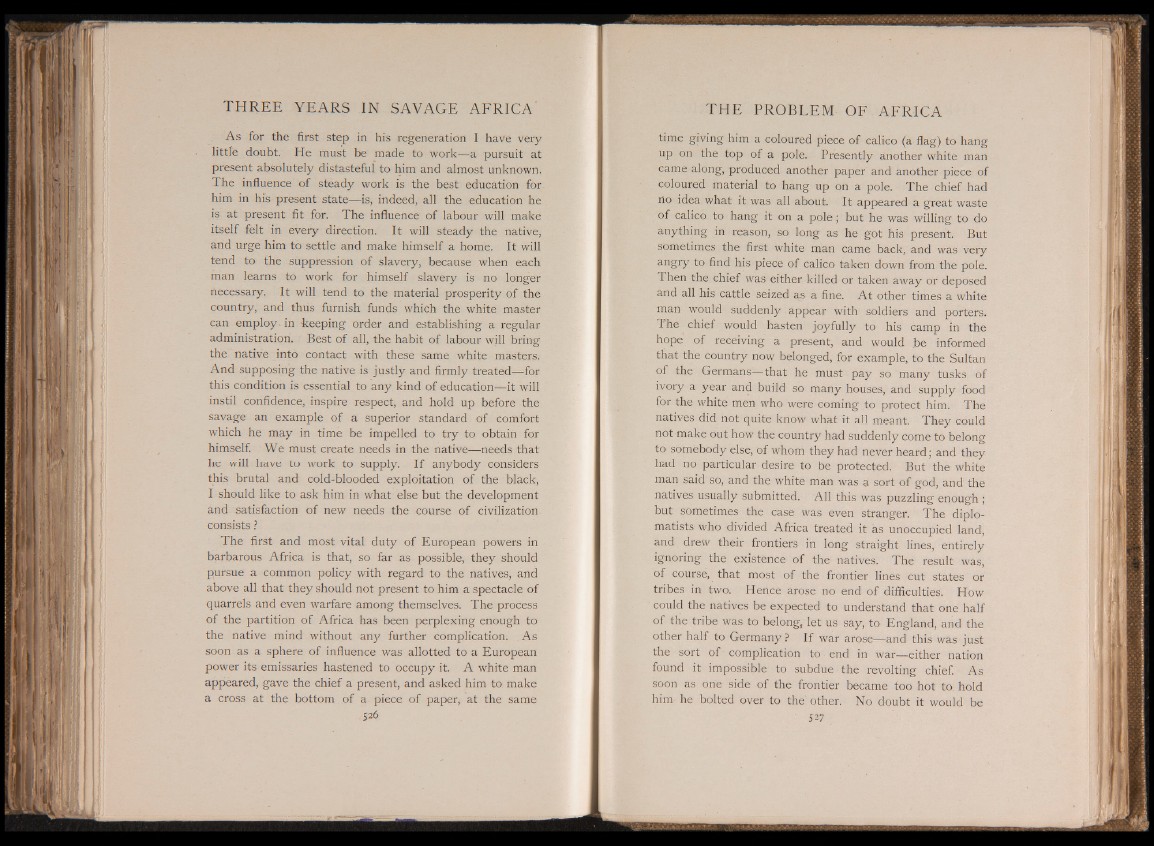
As for the first step in his regeneration I have very
little doubt. He must be made to work—a pursuit at
present absolutely distasteful to him and almost unknown.
The influence of steady work is the best education for
him in his present state—is, indeed, all the education he
is at present fit for. The influence of labour will make
itself felt in every direction. It will steady the native,
and urge him to settle and make himself a home. It will
tend to the suppression of slavery, because when each
man learns to work for himself slavery is no longer
necessary. It will tend to the material prosperity of the
country, and thus furnish funds which the white master
can employ»in keeping order and establishing a regular
administration. Best of all, the habit of labour will bring
the native into contact with these same white masters.
And supposing the native is justly and firmly treated—for
this condition is essential to any kind of education—it will
instil confidence, inspire respect, and hold up before the
savage an example of a superior standard of comfort
which he may in time be impelled to try to obtain for
himself. We must create needs in the native-Bneeds that
he will have to work to supply. If anybody considers
this brutal and cold-blooded exploitation of the black,
I should like to ask him in what else but the development
and satisfaction of new needs the course of civilization
consists ?
The first and most vital duty of European powers in
barbarous Africa is that, so far as possible, they should
pursue a common policy with regard to the natives, and
above all that they should not present to him a spectacle of
quarrels and even warfare among themselves. The process
of the partition of Africa has been perplexing enough to
the native mind without any further complication. As
soon as a sphere of influence was allotted to a European
power its emissaries hastened to occupy it. A white man
appeared, gave the chief a present, and asked him to make
a cross at the bottom of a piece of paper, at the same
526
time giving him a coloured piece of calico (a flag) to hang
up on the top of a pole. Presently another white man
came along, produced another paper and another piece of
coloured material to hang up on a pole. The chief had
rio idea what it was all about. It appeared a great waste
of calico to hang it on a pole; but he was willing to do
anything in reason, so long as he got his present. But
sometimes the first white man came back, and was very
angry to find his piece of calico taken down from the pole.
Then the chief was either killed or taken away or deposed
and all his cattle seized as a fine. At other times a white
man would suddenly appear with soldiers and porters.
The chief would hasten joyfully to his camp in the
hope of receiving a present, and would be informed
that the country now belonged, for example, to the Sultan
of the Germans—that he must pay so many tusks of
ivory a year and build so many houses, and supply food
for the white men who were coming to protect him. The
natives did not quite know what it all meant. They could
not make out how the country had suddenly come to belong
to somebody else, of whom they had never heard; and they
had no particular desire to be protected. But the white
man said so, and the white man was a sort of god, and the
natives usually submitted. All this was puzzling enough ;
but sometimes the case was even stranger. The diplomatists
who divided Africa treated it as unoccupied land,
and drew their frontiers in long straight lines, entirely
ignoring the existence of the natives. The result was,
of course, that most of the frontier lines cut states or
tribes in two. Hence arose no end of difficulties. How
could the natives be expected to understand that one half
of the tribe was to belong, let us say, to England, and the
other half to Germany ? If war arose—and this was just
the sort of complication to end in war—either nation
found it impossible to subdue the revolting chief. As
soon as one side of the frontier became too hot to. hold
him he bolted over to the other. No doubt it would be
527